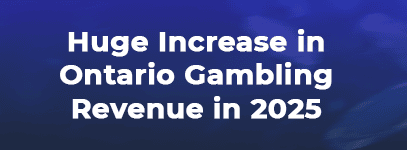Ontario Court Approves Cross Border Online Gaming
ConnexOntario 19+ OnlyThe Ontario Court of Appeal ruling on cross-border online gaming has come with a 4-1 decision that Ontarians can legally participate in online games with players outside the province and outside of Canada. This means that the province's regulated online gaming sites can legally allow Ontarians to play with people outside of Canada.
The decision came after the request from the provincial government to clarify the Criminal Code and it removes the key barrier that was in place for cross border gaming. This ruling could influence online gambling regulations across Canada and open the door for international partnerships. It could also see other provinces review their current frameworks too.

Online Gambling in Ontario
Online gambling in Ontario is regulated by iGaming Ontario (iGO) which was established in 2021 and legal gambling within the province launched in April 2022. The iGO approves licenses for private operators and manages the revenue distribution across the province.
Prior to the Court of Appeal ruling, players in Ontario could only compete against other player within the province. This limited the participation in games such as poker and daily fantasy sports which rely on bigger player pools. The rules that were in place created a closed system in Ontario that prevented international play. This could all change now and Ontarians will be able to play against other players in Canada and outside of the country.
Online gaming companies have reported that many Ontario poker players opt for international sites over provincially regulated ones because they are looking for higher stakes games. The Court of Appeal ruling could allow Ontario players to mix with non-Canadians and bring them into the regulated system along with more revenue for the province.
Criminal Code and International Online Gambling
Clarification was sought from the Ontario government on whether allowing international player pools for online gambling would contravene the Criminal Code. The key issues that was questioned was whether off-shore or cross-border gaming would be an unlawful expansion of the provinces gambling activities.
Chief Justice Michael Tulloch was of the majority opinion, and he confirmed the Ontario's plan did comply with the Criminal Code. The Court of Appeal saw four judges in favour with one dissenting in the 4-1 ruling that was published on the Court's website. The court reasoned that Ontario would retain the regulatory control over players in the province, regardless of where other players were located. This made the agreement lawful.
According to Tulloch, "Allowing Ontario to regulate players within its borders who wish to play online games against players outside Canada advances public safety by bringing such gaming under protective regulation, thereby reducing such risks as fraud and addiction."
Key Takeaways From The Court's Decision
There were a number of key points from the court's decision.
- More gambling activity under Ontario's regulated framework
- Reduce reliance on illegal or offshore sites
- Lower fraud risks
- Safeguards for addiction support and strict oversight
- Move more players to legal platforms
A recent study found that approximately 20 percent of Ontarians still use offshore and unregulated online gambling sites leaving them at risk of fraud and less help when it comes to safer gaming and preventing gambling harm.
CGA President Paul Burns said, "This decision is a significant victory for Ontario player consumers who enjoy pooled gaming activities like poker and DFS. It will bring back valuable options for players and increate the appeal of regulated platforms."
Provinces That Oppose Ontario's Plan to Expand Online Gambling
As with any change, there is always some opposition. Seven provinces opposed Ontario proposal arguing that the model could draw players in their jurisdiction to platforms beyond their control. They claim that the proposal could potentially benefit unregulated offshore operators and there were concerns over jurisdiction. Some claimed Ontario was aligning with illegal gambling groups which of course Ontario vehemently denied.
Alberta and Quebec did not oppose Ontario's plans. All provinces have 60 days in which to see an appeal. The Canadian Lottery Coalition hasn't confirmed its next steps. It stated that it will be reviewing the ruling.
If the Supreme Court agrees to hear the case, it could overturn the decision, uphold it, or clarify national rules for online gambling.
Implications for Ontario
iGaming revenues in Ontario are projected to reach $253 million for 2025-2026 which is nearly triple what it was three years ago. By allowing international player pools this could boost activity in poker and fantasy sports.
Ontario Lottery and Gaming revenues are much higher though at around $2.4 billion, so iGaming is a relatively small share.
In terms of wagers, peer-to-peer poker games saw $1.7 billion in wagers and $66 million in revenue between April 2024 and April 2025. This is according to the provincial figures.
Legal experts and gaming associations are in favour of the decision to allow regulated Ontario iGaming sites to let their users play against people in other countries and see it as a benefit for consumers, giving them more choice. They also see the potential for market growth. Games like poker and daily fantasy sports would see increased participation and more competitive play.
If Ontario's approach proves to be successful, it could see other provinces consider this model and the ruling could see a national review of gambling laws take place as well as opening up the opportunity for cross-border partnerships.




